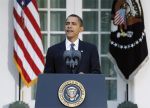(AP)—Why did President Barack Obama win the Nobel Prize? Does it have something to do with Afghanistan? Is the Nobel meant to reward accomplishments, or encourage future actions? What will the president do with the big cash prize?
 |
| SURPRISE HONOR —President Barack Obama speaks about winning the 2009 Nobel Peace Prize, Oct. 9, in the Rose Garden of the White House in Washington.
|
From water coolers to Twitter feeds, Americans are buzzing with questions about the Peace Prize surprise. Here are some answers.
Q: Is the Norwegian Nobel Committee, by giving the award to Obama, trying to discourage him from sending more troops to Afghanistan?
A: Committee chairman Thorbjoern Jagland told The AP that it was not explicitly trying to influence any change in Obama’s thinking about committing more troops to Afghanistan. But by getting the prize, and the status it confers, Obama may find himself with more leeway—at least abroad, if not at home—to seriously debate and decide whether such a surge is needed.
Q: Could the Nobel committee be trying to influence other aspects of U.S. foreign policy?
A: Yes, even if it is not trying explicitly to do so. The committee said that Obama had engaged in “extraordinary efforts to strengthen international diplomacy” and singled out his effort to “work for a world without nuclear weapons.”
The Nobel Prize carries a certain aura and is bound to make Obama more relevant on the world stage, particularly when it comes to scaling back nuclear weapons amid concerns that Iran may be pursuing them. Iran maintains that it wants nuclear power only for peaceful purposes.
“The vision of a world free from nuclear arms has powerfully stimulated disarmament and arms control negotiations,” the committee said.
Q: Why did the committee say it gave the prize to Obama?
A: The committee cited “his extraordinary efforts to strengthen international diplomacy and cooperation between peoples.”
They wanted to encourage his efforts to reach out to other countries and the United Nations to jointly address global issues. They singled out nuclear disarmament, but also said that thanks to Obama the United States is playing a more constructive role in efforts to fight climate change.
Q: Does the award typically have more to do with past accomplishments or with encouraging future efforts related to peace?
A: Both. The committee often uses the award to encourage and promote a cause or campaign. The awards to Al Gore and the U.N. panel on climate change in 2007, or in 1997 to anti-land mine activists, would fall into that category. Other years it honors people with a long history of peace work. Last year’s prize to longtime peace mediator Martti Ahtisaari was almost like a lifetime achievement award.
Q: Will Obama collect the prize in person?
A: Yes, the president plans to travel to Oslo, Norway, in December to accept the award.
Q: What is Obama going to do with the $1.4 million in prize money?
A: White House spokesman Robert Gibbs said the president will donate the cash award to charity. He said more than one charity will likely share the windfall, though Obama hasn’t yet chosen specific ones.
Q: Who’s on the committee that chooses the winner of the prize?
A: The committee has five members appointed by the Norwegian Parliament. The current members are Jagland, Sissel Roenbeck, Aagot Valle, Kaci Kullman Five and Inger-Marie Ytterhorn. The first three have backgrounds in Norway’s political left, while Five and Ytterhorn are from the right. They all said the decision to honor Obama was unanimous.
Q: Who can nominate candidates for the award? And when were nominations due?
A: The committee accepts nominations from former peace prize winners; current and former members of the committee and their staff; members of national governments and parliaments; professors of law, theology, social sciences, history and philosophy; leaders of peace research and foreign affairs institutes; and members of international courts of law.
The deadline for nominations was Feb. 1.